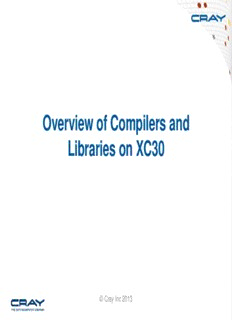
XC30 Compilers and Libraries - ARCHER PDF
Preview XC30 Compilers and Libraries - ARCHER
Overview of Compilers and Libraries on XC30 © Cray Inc 2013 Cray Programming Environment Distribution Focus on Performance and Productivity Programming Programming Optimized Scientific Compilers Tools I/O Libraries Languages models Libraries Distributed Environment setup LAPACK Memory Cray Compiling NetCDF Fortran (Cray MPT) Environment Modules (CCE) • MPI ScaLAPACK • SHMEM Debuggers HDF5 BLAS (libgoto) C Modules GNU Shared Memory • OpenMP 3.1 Allinea (DDT) Iterative Refinement • OpenACC 3rd Party lgdb Toolkit C++ Compilers PGAS & Global Debugging Support Cray Adaptive View Tools FFTs (CRAFFT) • UPC (CCE) • CAF (CCE) •Abnormal Python FFTW Termination • Chapel Processing Cray PETSc STAT (with CASK) Cray Trilinos Performance Analysis (with CASK) Cray developed •CrayPat • Cray Licensed ISV SW Apprentice2 3rd party packaging Cray added value to 3rd party Scoping Analysis Reveal 2 Using the Compiler Driver Commands ● You use compiler driver commands to launch all Cray XC compilers ● The syntax for the compiler driver is: cc | CC | ftn [Cray_options | Intel_options | GNU_options] files ● ● For example, to use any Fortran compiler (CCE, Intel, GNU) to compile prog1.f90 Use this command: ● ● % ftn prog1.f90 ● The compiler drivers are setup by the PrgEnv-??? Module PrgEnv-cray, PrgEnv-gnu, PrgEnv-intel ● ● Check that the craype-ivybridge module is loaded ● The drivers automatically support an MPI build No need to use specific wrappers such as mpiifort, mpicc ● 3 PLEASE NOTE : Cross Compiling Environment ● You are compiling on a Linux login node but generating an executable for a CLE compute node ● Do not use crayftn, craycc, ifort, icc, gcc, g++… unless you want a Linux executable for the service node ALWAYS Use ftn, cc, or CC instead ● Use the direct compiler commands if the executable is ● supposed to run on the service nodes (utilities, setup, …) 4 About the -I, -L and -l flags ● The compiler driver commands add specific flags depending on the loaded modules E.g. flags for debugging information when perftools ● module is loaded ● The modules add library and include paths for you, don’t do this yourself (for example in a Makefile) No additional MPI flags are needed (included by ● wrappers) You do not need to add any -I, -l or –L flags for the Cray ● provided libraries If your Makefile needs an input for –L to work correctly, try ● using ‘.’ If you really, really need a specific path, try checking ● ‘module show X’ for some environment variables ● Use the -v/-V options or set the environment variable CRAYPE_INFO_MESSAGE_ON to get details 5 Dynamic vs Static linking ● Currently static linking is default when using the compiler driver commands ● Independent of the PrgEnv loaded ● Will change in the future. Already changed when linking for GPUs (XK7 nodes) ● To specify how to link ● you can either set CRAY_LINK_TYPE to static or dynamic ● Or link with the -static or -dynamic options of the compiler driver commands ● Features of dynamic linking: ● smaller executable, automatic use of new libs ● Might need longer startup time to load and find the libs ● Environment (modules) should be the same between your compiler setup and your batch script (eg. when switching to PrgEnv-intel) ● Features of static linking: ● Faster startup ● Larger executable (but who cares) ● If you want to hardcode the rpath into the executable use ● CRAY_ADD_RPATH=yes ● This will always load the same version of the lib when running, independent on version being installed 6 The Cray Compilation Environment (CCE) © Cray Inc 2013 CCE Overview ● Cray technology focused on scientific applications Takes advantage of automatic vectorization ● Takes advantage of automatic shared memory parallelization ● ● Standard conforming languages and programming models ANSI/ISO Fortran 2003 and Fortran 2008 standards compliant ● ANSI/ISO C99 and C++2003 compliant ● OpenMP 3.1 compliant, working on OpenMP 4.0 ● OpenACC 1.0 ● ● OpenMP and automatic multithreading fully integrated Share the same runtime and resource pool ● Aggressive loop restructuring and scalar optimization done in the ● presence of OpenMP Consistent interface for managing OpenMP and automatic ● multithreading 8 CCE Overview (cont) ● Intel Sandy/Ivy Bridge support ● x86/NVIDIA compiler and library development ● Support for MPI 2.2 ● PGAS languages (UPC & Fortran Coarrays) fully optimized and integrated into the compiler ● UPC 1.2 and Fortran 2008 coarray support ● No preprocessor involved ● Target the network appropriately ● Support for hybrid programming using MPI across node and OpenMP within the node ● Support for IEEE floating-point arithmetic and IEEE file formats ● Cray performance tools and debugger support ● Program Library ● CCE 8.1 was released on September, 2012 ● The full release overview can be found at: http://docs.cray.com/books/S-5212-81/ 9 CCE Compiler Testing ● Roughly 35,000 nightly regression tests run for Fortran (14,000), C (7,000), and C++ (14,000) ● Default optimization, but for multiple targets (x86, x86+AVX+FMA, x86+NVIDIA), plus “debug” and “production” compiler versions ● Additionally, cycle through “options testing” with the same test base ● Fortran: -G0, -G1, -G2, -O0, -Oipa0, -Oipa5 -hpic, -O3,fp3 -e0 ● C and C++: -Gn, -O0, -hipa0, -hipa5, -hpic, -O3 -hfp3 -hzero ● Additional tests and suites have been added for GPU testing ● And some “stress test” option sets to create worse-case scenarios for the compiler ● Other combinations as necessary and by request ● Performance regression testing done weekly using important applications and benchmarks ● Functional and performance regressions typically use an automated system that isolates the change to a specific compiler or library mod ● Issues that are found as a result of testing but not immediately addressed have bugs opened to track them 10
Description: